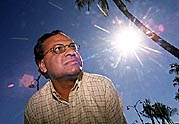By Jan TenBruggencate
Advertiser Science Writer
Ships crossing the seas for more than a century have kept records of the temperature of the ocean waters through which they sailed.
 |
| Vikran Mehta, a University of Maryland and NASA Goddard Space Flight Center meteorologist, is sharing his research at a climate conference this week at the East-West Center.
Bruce Asato • The Honolulu Advertiser |
Today, researchers are plugging into high-speed computer models the data from the readings of glass thermometers dipped in wooden and canvas buckets.
"And we found that we can trust these old data," said Vikran Mehta, a University of Maryland and NASA Goddard Space Flight Center meteorologist who is turning the information originally extracted from coffee-stained ships’ logs into up-to-the-minute climate predication data.
He and the others from around the world studying medium-term climate variability will be sharing their data during this week in Honolulu. Mehta is the organizer of the International Climate Research Conference, running today through Friday at the East-West Center. The sessions are sponsored by NASA, the International Pacific Research Center of the University of Hawai‘i’s School of Ocean and Earth Science and Technology, and the Climate Variability & Predictability Project of the World Climate Research Program.
About 80 speakers and 100 participants will review the latest in what is called decadal climate variability, which refers to cycles in weather that run from five to 20 years. That’s longer than the two to five years of an El Nino cycle, but far less than the vast cycles between, for example, ice ages.
Mehta said decadal changes are being understood as increasingly important because they may help predict dramatic weather patterns that "cause lots of misery in various parts of the world in terms of flooding or drought."
For example, in his own work, Mehta and co-researchers with the ship-recorded ocean temperature data found that when the waters of the tropical north Atlantic are comparatively warmer than those of the tropical south Atlantic, West Africa tends to get more rain, and northeast Brazil gets droughts that can last as long as five years.
Since the ocean temperature patterns and the rainfall/drought occur at the same time, one can’t be used to predict the other. But if scientists can predict what’s going to change the ocean temperature patterns, they might be able to use that to warn the people of Africa or South America about the weather they can anticipate for the next few growing seasons. It can tell them whether the land will be able to sustain them, and whether to plant water-loving or drought-tolerant crops.
And that’s useful information, all originating from countless sailors tossing buckets over the side to collect seawater.
Mehta said climate variability has become a hot field of science. Researchers are probing trees to study their rings, drawing ice cores out of glaciers, drilling ancient corals and studying sea floor sediments, seeking records of how the weather behaved in recent centuries. They are developing computerized models to juggle the data and try to find answers.
Speakers at the conference will review their observations of the east Asian monsoons, the salinity of the oceans as detected from space, long-term changes in the Kuroshio current that flows by Japan, relationships between ocean ice and the atmosphere over polar regions and more.
"This field is evolving so quickly that this kind of meeting is the only way to keep up. By the time a paper comes out it can be obsolete," Mehta said.
[back to top] |

